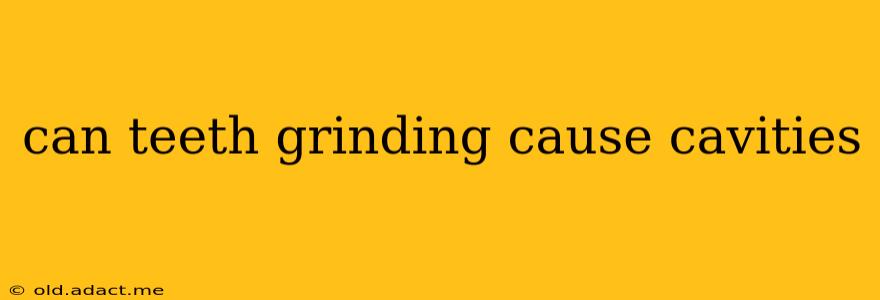Teeth grinding, also known as bruxism, is a common condition affecting millions. While not directly causing cavities, it creates a cascade of events that can significantly increase your risk. Understanding this connection is crucial for maintaining optimal oral health. This article will explore the link between teeth grinding and cavities, answering frequently asked questions and providing practical advice for prevention.
Does Teeth Grinding Weaken Teeth, Making Them More Prone to Cavities?
Yes, teeth grinding can weaken your teeth, making them more susceptible to cavities. The constant pressure and friction from bruxism can wear down tooth enamel, the hard outer layer protecting your teeth from decay. Thinned enamel is more vulnerable to acid attacks from bacteria in plaque, increasing the likelihood of cavity formation. This weakening also makes teeth more prone to cracking and chipping, further compromising their integrity.
Can Bruxism Lead to Gum Recession, Exposing More Tooth Surface to Decay?
Absolutely. Bruxism can lead to gum recession, exposing more of the tooth's root surface. The root surface is less protected than the enamel-covered crown, making it more susceptible to decay. Receding gums also create areas where plaque can easily accumulate, exacerbating the risk of cavities.
How Does Teeth Grinding Affect Dental Restorations and Increase Cavity Risk?
Teeth grinding puts significant stress on dental restorations like fillings, crowns, and veneers. This stress can lead to fractures or loosening of these restorations, creating crevices where bacteria can thrive and cavities can develop. Damaged restorations also provide entry points for bacteria to reach the underlying tooth structure, accelerating decay.
Are People Who Grind Their Teeth More Likely to Develop Cavities?
While not a direct cause, bruxism significantly increases the risk of developing cavities. The indirect effects – enamel wear, gum recession, and damage to restorations – create an environment more conducive to cavity formation. Individuals who grind their teeth should practice meticulous oral hygiene and have regular dental checkups to monitor their oral health closely.
What are the Best Ways to Prevent Cavities When You Grind Your Teeth?
Prevention is key. If you grind your teeth, you should:
- Practice Excellent Oral Hygiene: Brush and floss thoroughly twice a day using fluoride toothpaste.
- Use a Mouthguard: A custom-fitted nightguard from your dentist protects your teeth from the damaging effects of bruxism.
- Regular Dental Checkups: Routine checkups and professional cleanings allow your dentist to detect and address any early signs of decay or damage.
- Manage Stress: Stress is a common trigger for bruxism. Incorporating stress-reducing techniques like yoga, meditation, or exercise can be beneficial.
- Consider a Dietary Change: Limit sugary and acidic foods and drinks, as they contribute to enamel erosion and cavity formation.
Can a Dentist Help Prevent Cavities in Bruxism Patients?
Yes, your dentist plays a crucial role in preventing cavities in individuals who grind their teeth. They can:
- Diagnose Bruxism: Identify the severity of your grinding and recommend appropriate treatment.
- Provide Custom Mouthguards: Offer personalized nightguards to protect your teeth during sleep.
- Monitor for Early Signs of Decay: Detect and treat cavities at their earliest stages, preventing further damage.
- Repair Damaged Teeth and Restorations: Address any damage caused by bruxism, minimizing the risk of future problems.
By understanding the link between teeth grinding and cavities and taking proactive steps, you can significantly reduce your risk of developing dental decay and maintain a healthy, beautiful smile. Remember, regular dental checkups are essential for early detection and effective management.
